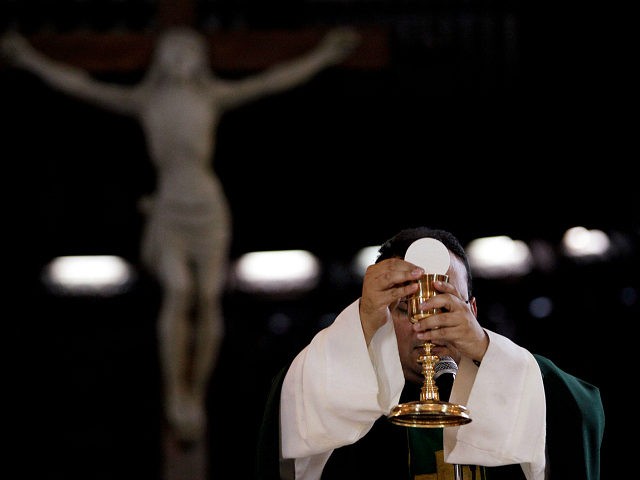The Santa Rosa de Lima church in Venezuela’s capital, Caracas, is reeling from a looting that left an altar of Mary destroyed and the church without its tools to perform Communion, including the Eucharist and chalice used to take in the holy wine.
The Venezuelan newspaper El Nacional reported, citing local sources, that the incident occurred early Monday morning around 3:00 AM and appeared to be both an act of larceny and desecration. The culprits destroyed an altar to the Virgin Mary, stealing some jewels from the statue at the altar, as well as stealing the chalice used for Communion, the Eucharist, and the tabernacle.
“We found the tabernacle on the roof of the church, though it is significantly damaged,” vicar Oswaldo Montilla said following the incident. He noted that the other stolen items remain lost.
The incident is the latest in a string of attacks on Catholic churches in the country, as an increasingly violent socialist dictatorship attempts to silence dissenting voices supported by Venezuelan Catholic leadership. Venezuela is about 96 percent Roman Catholic, and its anti-socialist leaders have repeatedly alluded to religion in their struggle against Nicolás Maduro’s dictatorship.
On Sunday, in five states – Caracas, Miranda, Vargas, Aragua, and Carabobo – Venezuelan Catholics assembled to celebrate the tradition St. John the Baptist festival. The festival occurred days after protesters shut down streets carrying a statue of Jesus wearing a Venezuelan flag in Maracaibo and a week after the Bolivarian National Guard (GNB) attacked Catholic protesters congregating in the capital with tear gas.
That same week, the National Police (PNB) blocked protesters from entering a cathedral in Mérida to pray.
Both the GNB and armed Chavista gangs have attacked Catholic centers of congregation and disrupted Catholic services for months, with the situation worsening following the daily protests that began in March against the Supreme Court. That month, the Supreme Court attempted to nullify the opposition-controlled legislature and establish itself as the lawmaking body of the country, a flagrant violation of the constitution. The court retracted its ruling, but protests have persisted daily into June.
Attacks against Catholic anti-socialists peaked in April when a Chavista gang stormed Holy Thursday services in Caracas and attacked the city’s archbishop, Jorge Urosa Savino. The attackers interrupted Urosa Savino’s sermon, in which he was advising peaceful dissident against the dictatorship. Multiple opposition leaders were in attendance at that service.
These attacks began long before Lent, however. In January, the Spanish newspaper ABC reported that the Venezuelan Catholic Church had documented regular attacks on its services for at least six months by Maduro supporters, according to Venezuelan Episcopal Conference president Monsignor Diego Padrón. That month, Chavista gangs attacked a Caracas church, took the believers inside hostage, and forced them to listen to a pro-socialist rant.
Given the overwhelming Catholic majority in the country, both Maduro and the opposition have attempted to reach out to the Vatican for mediation in the years of unrest in the country. Throughout 2016, the Vatican mediated “talks” between Maduro’s henchmen and the socialist-led Democratic Unity Roundtable (MUD) that led to no resolution.
The MUD eventually left the talks, while Maduro’s negotiators called Pope Francis “disrespectful.” Pope Francis met with Maduro personally and had previously met with opposition leaders, though he did not do so the last time Lilian Tintori, wife of political prisoner Leopoldo López, traveled to Rome.
The Venezuelan Catholic Church has been more aggressive than the Vatican in condemning Maduro. “It it is time to ask oneself, respectfully and seriously, if civil disobedience, peaceful marches, the just demands of national and international public powers, and civic protests are valid and opportune,” the Venezuelan Episcopal Conference said in a note distributed at Mass in April, apparently encouraging resistance.
Padrón, of the Venezuelan conference, issued a statement recently denying that Pope Francis was not as invested in the struggle for freedom in Venezuela as the country’s native clergy. “We are convinced that the Pope today supports all things done in favor of Venezuela,” he said in a press conference.

COMMENTS
Please let us know if you're having issues with commenting.